Kiran Peshawaria was born in a Peshawaria business family in Amritsar, Punjab, India, on June 9, 1949. While taking formal education at Sacred Heart Convent School in Amritsar, Kiran picked up a keen interest in lawn tennis. At 17, she became the National Junior Lawn Tennis Champion. She would go on to win the Asian Lawn Tennis Championship among several other trophies. Bedi completed her Masters in Political Science from Punjab University. She went on to take a Law degree from Delhi University and completed her Ph.D. from IIT Delhi. Kiran Bedi created history in 1972, when she became the First Female Indian Police Service (IPS) Officer. Her competence and remarkable record soon established her in the profession, making her a household name in India. In her 35 years in police service, Bedi played an important role in several areas including reduction in crimes in Delhi’s West District; a campaign against Drug Abuse; and introduction of several reforms at Tihar Jail, which gained worldwide acclaim and won her the Ramon Magsaysay Award in 1994. In 2003, Bedi became the first Indian woman to be appointed as a Police Advisor to Secretary-General of the United Nations. Post retirement Kiran Bedi came into focus yet again for joining the Anti-Corruption Movement in India in 2011. She is currently (2020) serving as the Lieutenant Governor of the union territory of Puducherry, India. Here are the 10 major achievements of Former Indian Police Service Officer, Kiran Bedi.
#1 SHE WAS THE NATIONAL WOMEN’S LAWN TENNIS CHAMPION
From a young age of 9, Kiran developed a love for lawn tennis while observing her father Prakash Lal Peshawaria, a tennis enthusiast and more than competent player. Prakash Lal trained his daughter to excel at the game and played a major role in Kiran’s Tennis carrier. Aged 14, she began to compete as an amateur tennis player, cutting her hair short as they interfered with her game. In 1964, Kiran played her first tournament outside Amritsar, participating in the National Junior Lawn Tennis Championship at Delhi Gymkhana Club and losing out in the early rounds. Nonetheless, with iron determination and never say die attitude, she went on to win the trophy two years later, in 1966 at the age of 17. As the National Junior Champion, she was eligible for entry to the Wimbledon Junior Championship, but was not nominated by the Indian administration. Between the period 1965 to 1978, Kiran won several Tennis Championships including the Asian Lawn Tennis Championship in 1972 but her biggest achievement came in 1976, when she lifted National Women’s Lawn Tennis Championship Title. Kiran Bedi was also a part of Indian team that beat Sri Lanka to win the Lionel Fonseka Memorial Trophy in Colombo. Kiran continued playing tennis till the age of 30.
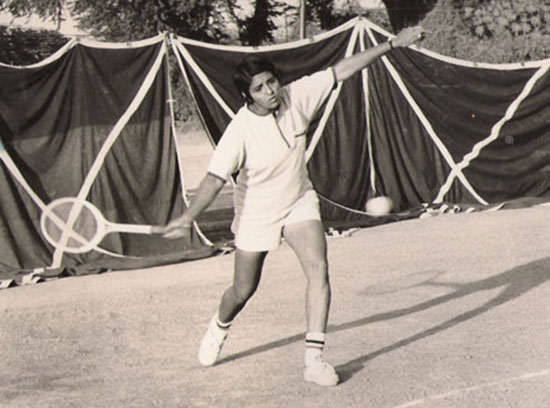
#2 SHE BECAME THE FIRST FEMALE IPS OFFICER IN INDIA
Kiran attended Amritsar’s Government College for Women and graduated with a Bachelor of Arts Degree in English (Honors) with the Class of 1968. Further, she pursued Master’s Degree in Political Science from Punjab University, Chandigarh with the class of 1970. After completing her Post Graduation, Kiran worked as a Lecturer at Khalsa College for Women in Amritsar and taught courses related to Political Science. Meanwhile, Kiran frequented the Service Club in Amritsar, where interaction with Senior Civil Servants inspired her to take up a career in the Public Service. Two years into her teaching career, she cleared the highly competent Indian Civil Services Examination and became an Indian Police Service (IPS) Officer in 1972. The event made her the first woman in India to join the prestigious service. Kiran Bedi underwent training at the National Academy of Administration in Mussoorie where she was the only woman in a batch of 80 men. She started her career as an Assistant Superintendent of Police (ASP) in 1975. During her long career in the Indian Police Service, she served as the Chief of New Delhi Traffic Police, DIG of Police in Mizoram, Advisor to the Lt. Governor of Chandigarh, Director General of Narcotics Control Bureau and Civilian Police Advisor for United Nations Peacekeeping operations. On 27 November 2007, after 35 years of dedicated tenure, she voluntarily retired from the Indian Police Service to focus on Academic and Social Work.
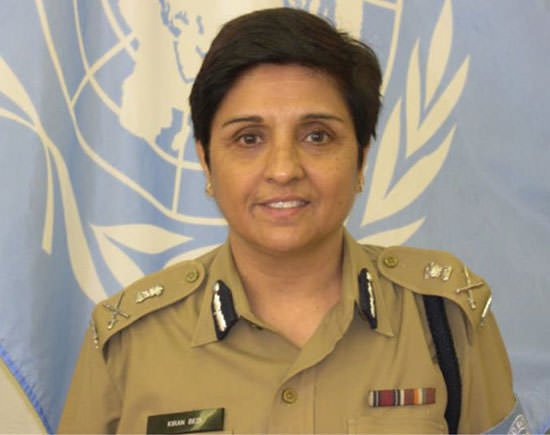
#3 SHE WAS AWARDED THE PRESIDENT’S POLICE MEDAL FOR GALLANTRY IN 1979
In 1975, Kiran Bedi took her first posting in Chanakyapuri subdivision of Delhi. Chanakyapuri was an affluent area that included the Parliament building, foreign embassies and the residences of the Prime Minister and the President. The crimes in the area were mainly limited to minor thefts, but political demonstrations were a regular occurrence. On November 15, 1978, a group of Nirankaris held a congregation near India Gate. A contingent of 700–800 Akalis organized a demonstration against them and there were many clashes between the parties. As a result, Kiran Bedi, Deputy Commissioner of Police, was deployed to stop the protesters and prevent violence. As the protesters resorted to brick-batting, one of the demonstrators ran towards her with a naked sword, but regardless of her personal safety, she charged the said demonstrator and others with the cane which ultimately succeeded in dispersing the demonstrators and restoring peace in the area. Despite lack of support of tear gas squad, she exhibited conspicuous courage and demonstration in controlling the unruly demonstrators at a grave personal risk to her life. Due to her heroic display, Kiran Bedi was awarded the President’s Police Medal for Gallantry by President of India in 1979.
#4 SHE PLAYED A KEY ROLE IN THE REDUCTION OF CRIMES IN WEST DISTRICT OF DELHI
In 1979, when Bedi was posted to Delhi’s West District, the region was grappling with high volume of criminal activity and sexual assault cases against women. In addition, there were not enough officers to handle the unfavorable scenario. To handle the situation Kiran Bedi came up with a plan to combat the crimes with the help of recruited civilian volunteers. Each village thus began to be patrolled by six civilian recruits led by an armed policeman. Her novel approach made her more approachable to citizens who were encouraged to interact with her. She enabled an Open Door Policy and implemented anonymous reporting about the knowledge of any crimes. The results were miraculous and in a short span of 3 months, there was a sharp drop in number of cases related to eve teasing /sexual harassment. Furthermore, she also clamped down on Bootlegging and the Illicit Liquor Business to reduce crimes in the area.
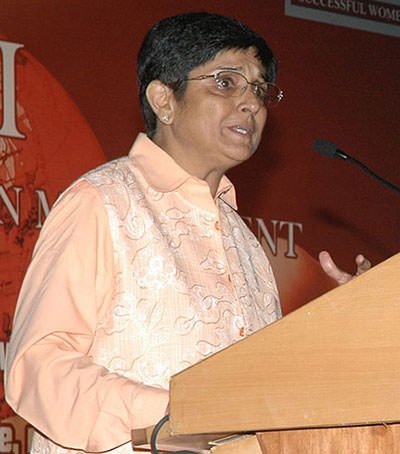
#5 SHE LAUNCHED A CAMPAIGN AGAINST DRUG ABUSE
In 1986, Dr. Kiran Bedi became Deputy Commissioner of Police of Delhi’s North District. The primary issue of the area was Drug Abuse. At the time, Delhi had only one center for treatment of drug addicts (Ashiana), which was run by the New Delhi Municipal Corporation. Looking into the graveness of the problem, Bedi came up with yet another novel solution. With the help of her senior officers, she launched a Non-Government Organization, along with 16 serving police officers of Delhi Police. Detox centers were opened on Police premises and worked for the rehabilitation of drug addicts, education of street children, vocational skills for women drug peddlers and detox programs. These detox centers relied on community donations and received voluntary services from Doctors and Yoga Teachers. The idea took root and in a few years, several Detox Centers were set up, with each center intended to serve up to 30 to 100 patients. Kiran Bedi travelled the length and breadth of India, spreading awareness about the program, the consequences of drug abuse and highlighting the responsibility of schools, universities, parents, police and the community. Kiran’s work became a pioneering movement and, in 2007, the Non-Profit Organization was renamed to Navjyoti India Foundation (NIF), where “Navjyoti” means “New Light”. Since then, NIF has provided residential treatment to nearly 20,000 drug and alcohol dependents and has benefited thousands more through its community outreach programs in India. Apart from the treatment, the center has received support from a German NGO and the American Government to enable it move into the area of Research & Training as well. Currently, Navjyoti enjoys overwhelming support from Government of India and they have exponentially expanded to other social issues like illiteracy and women empowerment.
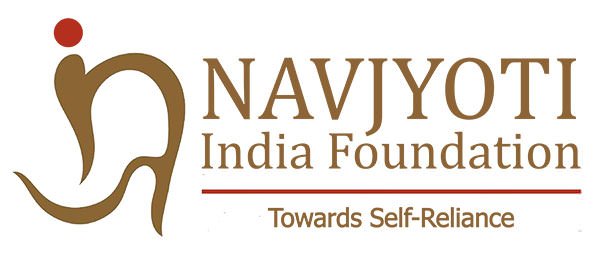
#6 SHE WON THE RAMON MAGSAYSAY AWARD FOR HER REFORMS IN TIHAR JAIL
In May 1993, Kiran Bedi was posted to the Delhi Prisons as Inspector General (IG) of Police. The challenge this time was the most notorious prison in India, Tihar Jail of Delhi; a nightmare for most officers. The prison was a four-jail complex with an inmate capacity of 2500 prisoners but it housed close to 9000 prisoners at the time. An overwhelming majority of these prisoners were under trials for non-bailable offensives. The place had a meagre budget allocation of 15 crore, saw frequent violent incident and was considered as unmanageable. Bedi took up the challenge and decided to turn Tihar into a Model Prison. She introduced several notable reforms in the management while serving as the Inspector General of Prisons during the years 1993 to 1995. Bedi arranged Vocational Training for the prisoners with Certificates, so that they could find a job after their release. Yoga and Vipassana Meditation Classes were introduced to change the prisoners’ attitudes, while additional activities such as sports, prayer and festival celebrations were encouraged. A De-Addiction Center was established and staff members involved in drug supply were strictly acted upon. A Bakery and small manufacturing units, including Carpentry and Weaving Units, was also set up. The profits from the products sold were put into the Prisoners’ Welfare Fund. In this Prison Reform Programme, Bedi involved outsiders including NGOs, schools, civilians and former inmates. She went on daily prison tours, observing the staff, listening to prisoners’ complaints, inspecting food quality and evaluating overall management. As a result of her reforms, there was a drop in the fights and disturbances in the jail and the program went on to receive worldwide acclaim. This short stint of Kiran Bedi is remembered as a golden period in the history of the prison. Her efforts at Tihar won her the Ramon Magsaysay Award in 1994 (referred to as Asia’s Nobel) and the Jawahar Lal Nehru Fellowship.
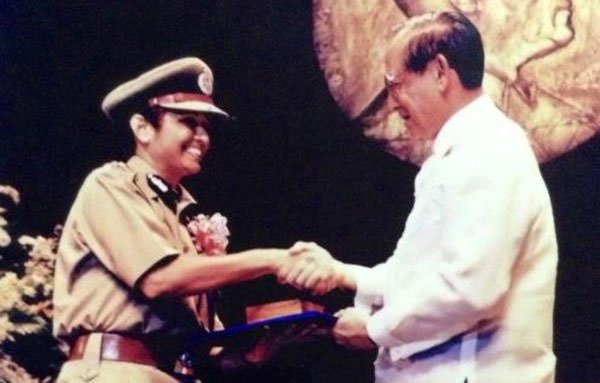
#7 SHE WAS FIRST INDIAN WOMAN TO BE APPOINTED CIVILIAN POLICE ADVISOR IN U.N.
In 2002, Kiran Bedi received a proposal to take up a Senior Position in the United Nations at New York. Due to the prospect of gaining international experience on a larger scale, she agreed to the proposal and was chosen from a wide pool of distinguished candidate. In January 2003, Kofi Atta Annan, the 7th Secretary-General of the United Nations appointed her as the Civilian Police Advisor. Bedi made history by becoming the first woman to achieve such a role in the United Nations. She worked in the Department of Peacekeeping Operations with her colleagues, under the guidance of her senior, Jean Marie Guehenno, the Under-Secretary General. During her tenure, she travelled widely, published articles, indulged in speaking engagements and interacted with numerous universities & institutions. In 2005, after her glorious stint at United Nations as Civilian Police Advisor, she returned to Delhi.
#8 SHE WAS A PROMINENT LEADER IN THE 2011 ANTI-CORRUPTION MOVEMENT
By 2010, the Indian public was seething after the exposition of several scams which ran into thousands of crores of rupees; the most noteworthy being the 2G spectrum scam (1.76 lac crore, 2008), Satyam Scam (14,000 crore, 2009) and the Commonwealth Games Scam (70,000 crore, 2010). This blatant loot of the public money resulted in an Anti-Corruption Movement in 2011 under the leadership of Shri Anna Hazare. Kiran Bedi allied and joined other activists including Arvind Kejriwal (former bureaucrat and currently the 7th Chief Minister of Delhi) to form India Against Corruption (IAC) Group. The group demanded enactment of the Jan Lokpal Bill, an independent body to investigate corruption cases. Eventually, the campaign evolved into the eminent 2011 Indian Anti-Corruption Movement which included series of demonstrations and protests across India intended to establish strong legislation and enforcement against perceived endemic political corruption. The movement attracted global attention and was named among the “Top 10 News Stories of 2011” by Time Magazine. On 16 August 2011, Bedi and other key members of IAC were detained by the police, only to be released later on the same day. The movement resulted in a round of talks between the Government and the Activists, and the Parliament passed a resolution to consider three points in drafting of Lokpal Bill: Citizen Charter, Lower Bureaucracy to be under Lokpal through an appropriate mechanism and establishment of Lok Ayuktas in the states. However, in spite of being a prominent face of the movement, Kiran Bedi split from India Against Corruption (IAC) Group after a faction led by Arvind Kejriwal formed the political party named the Aam Aadmi Party (AAP) in 2012.
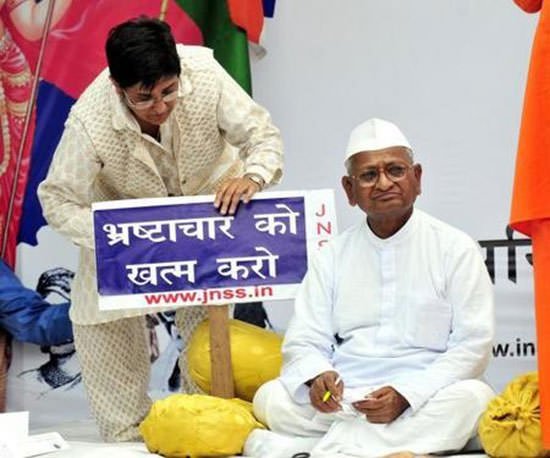
#9 SHE WAS APPOINTED AS LIEUTENANT GOVERNOR OF PUDUCHERRY IN 2016
Dr. Kiran Bedi joined Bhartiya Janta Party (BJP) in 2015 after the party’s routing win in the 2014 Lok Sabha (central) elections. She unsuccessfully contested the 2015 Delhi Assembly Election as the party’s Chief Ministerial candidate. On 22 May 2016, President of India Pranab Mukherjee, appointed her to serve as the 24th Lieutenant Governor of the union territory of Puducherry. In her new post, Kiran Bedi initiated to open the gates of Raj Nivas (Governor’s residence) to the public, thereby making it the “People’s Nivas”. She started an ‘Open House’ process where the public could visit Raj Nivas from Monday to Wednesday at 5 PM to meet the Lieutenant Governor in person and have their grievances addressed. One of the most significant achievements of Dr Kiran Bedi as the Lieutenant Governor of Puducherry has been with her project “Mission Water Rich Puducherry”. When she heard that the Public Works Department (PWD) did not have enough funds to de-silt water channels and the drains, she brought in community support in the form of CSR, connected donors with JCB machine contractors. She then had the channels de-silted in short notice. As the Lieutenant Governor, she has further introduced several best practices in Puducherry that are related to Management Lessons, recently outlined by her at the 50th Governors Conference in Delhi. Beginning with Financial Prudence to bringing in Community Support and having an Open House, each of these practices have helped in massive development of Puducherry.
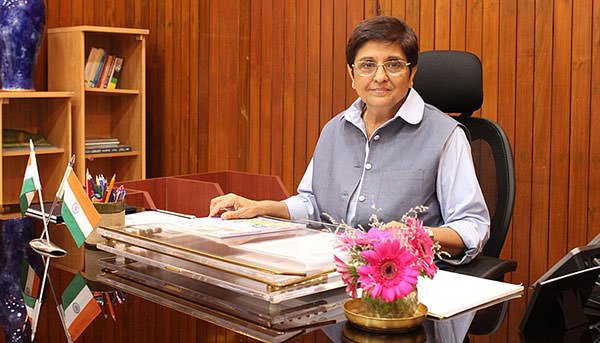
#10 SHE WAS VOTED AS INDIA’S MOST ADMIRED BY THE WEEK IN 2002
Shrimati (Mrs) Kiran Bedi has long been an icon and inspiration for the people India. She was voted as India’s most admired (THE WEEK 2002); most trusted woman in India (Readers Digest, March 2010, Navbharat Times 2012); MSN Most Admired Indian Female Icon 2011; and amongst top 10 women Icons of 2013 by The Economic Times. In 2018, she was featured in Mega Icons, an innovative Multi-Part Series which has been conceptualized by National Geographic. The Show revolves around the success stories of Inspirational Personalities. Besides the President’s Gallantry Medal, she has received several prestigious awards like the International Woman Award in 1992, the United Nations’s Medal for outstanding service (2004), the June Morrison-Tom Gitchoff award for significant improvement of the quality of justice (2001) and the Asia Region Award (1991) for drug prevention and control. Kiran Bedi has also authored more than a dozen books including It’s Always Possible: One Woman’s Transformation of Tihar Prison; Empowering Women… As I See; Be the Change: Fighting Corruption; Yeh Sambhav Hai (in Hindi); and Dr. Kiran Bedi: Creating Leadership.

